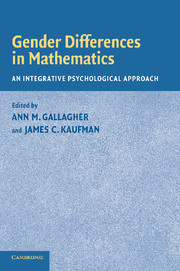Book contents
- Frontmatter
- Contents
- Preface
- Acknowledgments
- List of Contributors
- 1 Research on the Women and Mathematics Issue: A Personal Case History
- 2 The Perseverative Search for Sex Differences in Mathematics Ability
- 3 A Psychobiosocial Model: Why Females Are Sometimes Greater Than and Sometimes Less Than Males in Math Achievement
- 4 Gender Differences in Math: Cognitive Processes in an Expanded Framework
- 5 Cognitive Contributions to Sex Differences in Math Performance
- 6 Spatial Ability as a Mediator of Gender Differences on Mathematics Tests: A Biological–Environmental Framework
- 7 Examining Gender-Related Differential Item Functioning Using Insights from Psychometric and Multicontext Theory
- 8 The Gender-Gap Artifact: Women's Underperformance in Quantitative Domains Through the Lens of Stereotype Threat
- 9 “Math is hard!” (Barbie™, 1994): Responses of Threat vs. Challenge-Mediated Arousal to Stereotypes Alleging Intellectual Inferiority
- 10 The Role of Ethnicity on the Gender Gap in Mathematics
- 11 The Gender Gap in Mathematics: Merely a Step Function?
- 12 “I can, but I don't want to”: The Impact of Parents, Interests, and Activities on Gender Differences in Math
- 13 Gender Effects on Mathematics Achievement: Mediating Role of State and Trait Self-Regulation
- 14 Gender Differences in Mathematics Self-Efficacy Beliefs
- 15 Gender Differences in Mathematics: What We Know and What We Need to Know
- Author Index
- Subject Index
- References
8 - The Gender-Gap Artifact: Women's Underperformance in Quantitative Domains Through the Lens of Stereotype Threat
Published online by Cambridge University Press: 05 June 2012
- Frontmatter
- Contents
- Preface
- Acknowledgments
- List of Contributors
- 1 Research on the Women and Mathematics Issue: A Personal Case History
- 2 The Perseverative Search for Sex Differences in Mathematics Ability
- 3 A Psychobiosocial Model: Why Females Are Sometimes Greater Than and Sometimes Less Than Males in Math Achievement
- 4 Gender Differences in Math: Cognitive Processes in an Expanded Framework
- 5 Cognitive Contributions to Sex Differences in Math Performance
- 6 Spatial Ability as a Mediator of Gender Differences on Mathematics Tests: A Biological–Environmental Framework
- 7 Examining Gender-Related Differential Item Functioning Using Insights from Psychometric and Multicontext Theory
- 8 The Gender-Gap Artifact: Women's Underperformance in Quantitative Domains Through the Lens of Stereotype Threat
- 9 “Math is hard!” (Barbie™, 1994): Responses of Threat vs. Challenge-Mediated Arousal to Stereotypes Alleging Intellectual Inferiority
- 10 The Role of Ethnicity on the Gender Gap in Mathematics
- 11 The Gender Gap in Mathematics: Merely a Step Function?
- 12 “I can, but I don't want to”: The Impact of Parents, Interests, and Activities on Gender Differences in Math
- 13 Gender Effects on Mathematics Achievement: Mediating Role of State and Trait Self-Regulation
- 14 Gender Differences in Mathematics Self-Efficacy Beliefs
- 15 Gender Differences in Mathematics: What We Know and What We Need to Know
- Author Index
- Subject Index
- References
Summary
Women in the traditionally masculine field of mathematics must contend with stereotypes that allege a sex-based math inability. The threat of being personally reduced to these gender stereotypes can evoke a disruptive state that undermines women's math performance – a situational predicament termed “stereotype threat.” Women are susceptible to stereotype threat whenever they risk fulfilling, or being judged by, a negative gender stereotype that provides a plausible explanation for their behavior in a given domain. This chapter examines the insidious effects that stereotype threat can have on women's performance and aspirations in all quantitative fields.
Picture in your mind the typical computer scientist. Now picture the typical librarian. Is the librarian shy and the computer scientist socially awkward? Do they both wear glasses? Are they both inept at sports? Is the computer scientist a male and the librarian a female? Most people can clearly articulate the content of stereotypes targeted at various groups in our society, and gender stereotypes are no exception. As Brown and Josephs (1999) suggest, stereotypes regarding gender differences in math and science ability still pervade contemporary Western thought. In fact, if you assumed that the direction of those gender differences benefited men, you have just displayed personal knowledge of some of the negative stereotypes targeted at women in our culture. This is not meant to imply that you personally endorse those stereotypes – research has shown no relationship between personal beliefs and knowledge of stereotypes (Devine, 1989; Devine & Elliot, 1995).
Information
- Type
- Chapter
- Information
- Gender Differences in MathematicsAn Integrative Psychological Approach, pp. 172 - 188Publisher: Cambridge University PressPrint publication year: 2004
References
Accessibility standard: Unknown
Why this information is here
This section outlines the accessibility features of this content - including support for screen readers, full keyboard navigation and high-contrast display options. This may not be relevant for you.Accessibility Information
- 3
- Cited by
